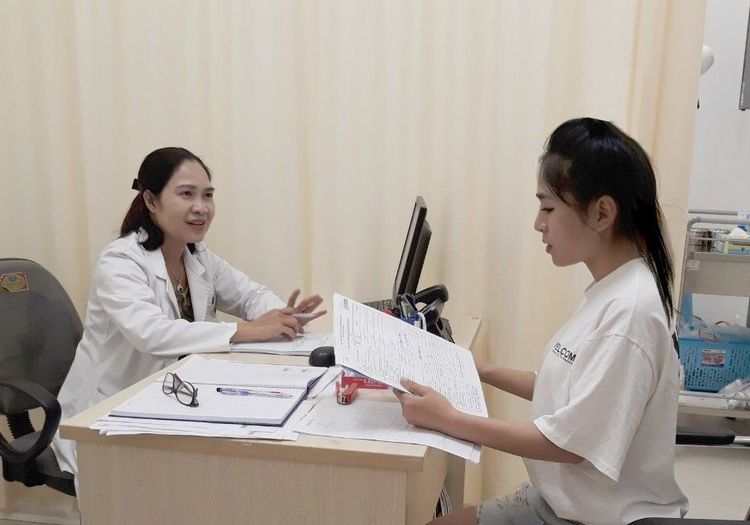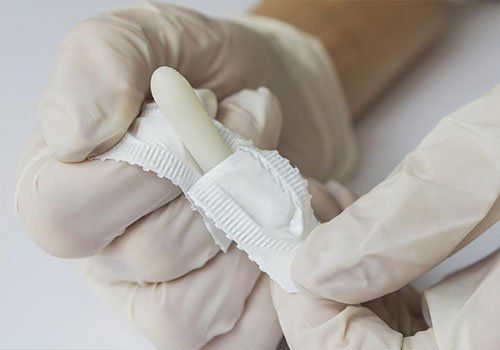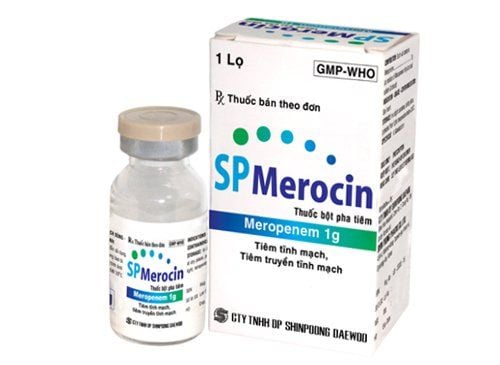This is an automatically translated article.
The article was professionally consulted with Specialist II, Doctor Nguyen Thi Minh Tuyet - Obstetrician and Gynecologist - Department of Obstetrics and Gynecology - Vinmec Central Park International General Hospital.Pelvic inflammatory disease is an inflammatory disease of the female reproductive organs such as the uterus, fallopian tubes and ovaries. The disease may improve with antibiotic treatment. However, the sequelae of the adhesive cord healing after inflammation can affect a woman's fertility.
1. What is pelvic inflammatory disease?
Pelvic inflammatory disease is an infection in a woman's uterus, fallopian tubes, and/or ovaries. It occurs when bacteria travel from the vagina and cervix to adjacent parts of the upper genital tract.Accordingly, pelvic inflammatory disease is also one of the serious infectious diseases, which is a progressive condition when sexually transmitted diseases as well as infections in other nearby organs are not treated. treat. This is also a cause to be considered when a patient presents to a doctor because of persistent pelvic pain or infertility.
Overall, pelvic inflammatory disease is a relatively common gynecological condition, with more than one million people having it each year.
2. What warning signs of pelvic inflammatory disease?
Most women don't know they have pelvic inflammatory disease in its early stages. This is because pelvic inflammatory disease often doesn't show any symptoms or the symptoms are so mild that you don't feel them yourself - especially during the first infection. The longer the inflammation persists, and the more extensive the damage, the worse the symptoms tend to get.At this point, signs of pelvic inflammatory disease may include:
Abdominal pain Fatigue Nausea and vomiting Fever or chills Vaginal discharge with a strong odor Pain during sex Unusual vaginal bleeding Menorrhagia Blood Some signs of pelvic inflammatory disease can be confused with other conditions, such as appendicitis or endometriosis. Therefore, when having one or more of the above-mentioned signs, the patient should see a doctor soon and be examined by a doctor to diagnose the disease.

3. Who can get pelvic inflammatory disease?
Pelvic inflammatory disease has a higher risk of occurring in people with the following risk factors:High frequency of sexual activity Age at early onset of sex, under 25 years of age Having multiple sexual partners Use stimulants, drugs that make it difficult to control sex child, abortion or miscarriage. At this point, if bacteria enter the vagina, the infection can spread easily because the cervix has not closed completely. Use of an IUD After endometrial biopsy is not sterile Inflammation of the abdominal organs such as appendicitis caused by bacteria spreading from the appendix to the pelvic cavity

4. Are the complications of pelvic inflammatory disease dangerous or not?
If pelvic inflammatory disease is left untreated, it can lead to many serious health problems, sometimes even life-threatening. The infection can spread to other parts of the body, causing peritonitis, or bacteria into the bloodstream causing sepsis or septic shock.Not only that, even if pelvic inflammatory disease is treated, the treatment cannot undo the damage such as scarring and adhesions caused by the infection. Therefore, for reproductive function in particular, pelvic inflammatory disease can increase the risk of ectopic pregnancy, if it can cause serious complications. In addition, people with chronic, asymptomatic pelvic inflammatory disease are only found to have the disease when they go to the doctor for infertility.
5. How can pelvic inflammatory disease be prevented?
Proactively performing screening tests for sexually transmitted diseases is the best way to prevent pelvic inflammatory disease, especially when you yourself have many risk factors. In particular, the causative agent of pelvic inflammatory disease caused by chlamydia or gonorrhea is quite common. Meanwhile, most people with chlamydia or gonorrhea don't have any symptoms. That's why testing is considered the only way to know for sure if you have one of these infections.At the same time, the risk of pelvic inflammatory disease will be lower when you have a healthy sex life with safe sex, only one partner and use condoms every time you have sex.
In addition, the hygiene of the genital area in women such as frequent douching habits will disrupt the resident microbial strains, creating favorable conditions for pathogenic bacteria strains to develop. What's more, the act of douching pushes germs inside, making cleaning and treatment more difficult.

In order to help customers detect and treat other gynecological diseases early, Vinmec International Hospital has a basic gynecological examination and screening package, helping customers detect early inflammatory diseases Easy, inexpensive treatment. Screening detects gynecological cancer (cervical cancer) early even when there are no symptoms.
Please dial HOTLINE for more information or register for an appointment HERE. Download MyVinmec app to make appointments faster and to manage your bookings easily.














